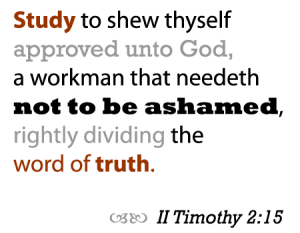THINGS TO COME, A Journal of Biblical Literature. No. 37., JULY, 1897., Vol. IV., No. 1., pp. 9, 10. Questions and Answers.
J. D., Edinburgh. “Will you please explain the difference between ‘the Gospel of the Kingdom’ and ‘the Gospel of the grace of God’ ?”
(This is an excellent article from 1897 on the difference between these two gospels. However, I have taken the liberty to edit some remarks which are not related to the issue. –Dave Reese )
“There are some who maintain that there can be only one Gospel. Such forget that the word Gospel means good news, and that news may be of various kinds, though it may concern the same person.
The difference between the good news concerning the Kingdom and the good news concerning the Grace of God may be briefly stated thus:In the Gospel of the Kingdom the Lord Jesus is proclaimed as the seed of David, the Man raised up and Anointed by God to reign over the people of Israel and over the Gentiles (Rom. xv. 12).
In the Gospel of the Grace of God, the Lord Jesus is declared to be the Son of God, the Man in whom God came down to put away sin by the sacrifice of Himself, that sinful men might be justified and sanctified, made fit for the presence of the glory of God (Col. i. 12).
The former was preached to the Jews and in association with Jerusalem. The latter is the present testimony of God among the Gentiles while Jerusalem is trodden down of the Gentiles.
Jesus was born into the world, King of the Jews (Matt. ii. 2), to reign over the house of Jacob (Luke i. 33). The kingdom which John the Baptist proclaimed as at hand was the kingdom foretold by Daniel the prophet (chap. ii. 44) : “The God of heaven shall set up a kingdom.” This kingdom is the literal and yet future reign of Christ over the earth when He “shall sit upon the throne of His glory” (Matt. xxv. 31), as “King of kings and Lord of lords” (Rev. xix. 16)—the time commonly spoken of as the Millennium.
The kingdom, which is the subject of the Old Testament prophets (Acts iii. 24), was proclaimed to the Jews ; by John the Baptist, by the Lord Jesus, by the twelve apostles, from Matt. iii. 2 into Acts.
The rulers of the Jews, those responsible for the nation rejected the testimony in all its phases ; they crucified the Lord Jesus, and persecuted His apostles. Consequently as a nation they were cast out (though not “cast away forever”), Jerusalem was destroyed, and testimony to Christ Jesus as the King, as an official testimony from God was ended.
There is no proclamation to the world of Christ as King, with Divine authority and power while the people of Israel are not a nation. Through the fall of Israel “salvation is come unto the Gentiles” (Rom. xi. 11), and the grace of God is manifested to those who were “without God in the world” (Eph. ii. 12). This ministry of grace was not committed to the twelve apostles, whom the Lord sent to preach the kingdom (Acts i. 3), but to Paul.
God revealed His Son to Paul “that he might preach Him among the Gentiles” (Gal. i. 15, 16). Immediately Paul preached Christ at Damascus “that He is the Son of God” (Acts ix. 20). Paul’s first apostolic mission as sent out by the Holy Ghost is recorded in Acts xiii. 4, and his discourse declares the first principles of Christianity ; the Sonship of Christ, forgiveness of sins and justification by faith, and the issue—eternal life (vers. 33, 39, 46).
“When these things were ended” (Acts xix. 21) Paul began to write his epistles to the Gentiles, in which is committed to us the order for the Church of God among the Gentiles in separation from Jerusalem, and “the fullness of the blessing of the Gospel of Christ” (Rom. xv. 19). Christ is declared to be the Head of a New Creation and the Head of the Church which is His Body. “The Mystery hidden from ages and generations.”
The Gospel committed to the Church among the Gentiles is concerning “Christ no more known after the flesh,” i.e., as the seed of David and as the King of Israel (2 Cor. v. 16), but as a Divine Person (ver. 19)— “God was in Christ reconciling the world unto Himself,” and as the Sin- offering for us (sinners). “For God hath made Him to be sin for us, who knew no sin : that we might be made the righteousness of God in Him” (ver. 21). This is the Gospel of the Grace of God ; to be preached to Jew and Gentile alike as lost sinners while Jerusalem is desolate.
When 1 Thess. iv. 16, 17 is fulfilled ; when the Jews are restored to their land and are again become a nation, then the Gospel of the Kingdom will again be preached by a Jewish ministry, a revived Apostleship, according to Matt. xxiv. 14 ; xviii. 19, 20 ; and Rev. xiv. 6. It will be the proclamation to the nations that God is about to deliver His people Israel, according to Dan. xii. 1-3, to set His King upon His holy hill of Zion and to execute judgment upon His enemies (Psa. ii. 6-12).
This immediately precedes “the Day of the Lord,” the subject of the prophecy of Joel, and the complete fulfillment of what began on the day of Pentecost (Acts ii.), but was not completed because the nation did not obey the call to repentance.”

